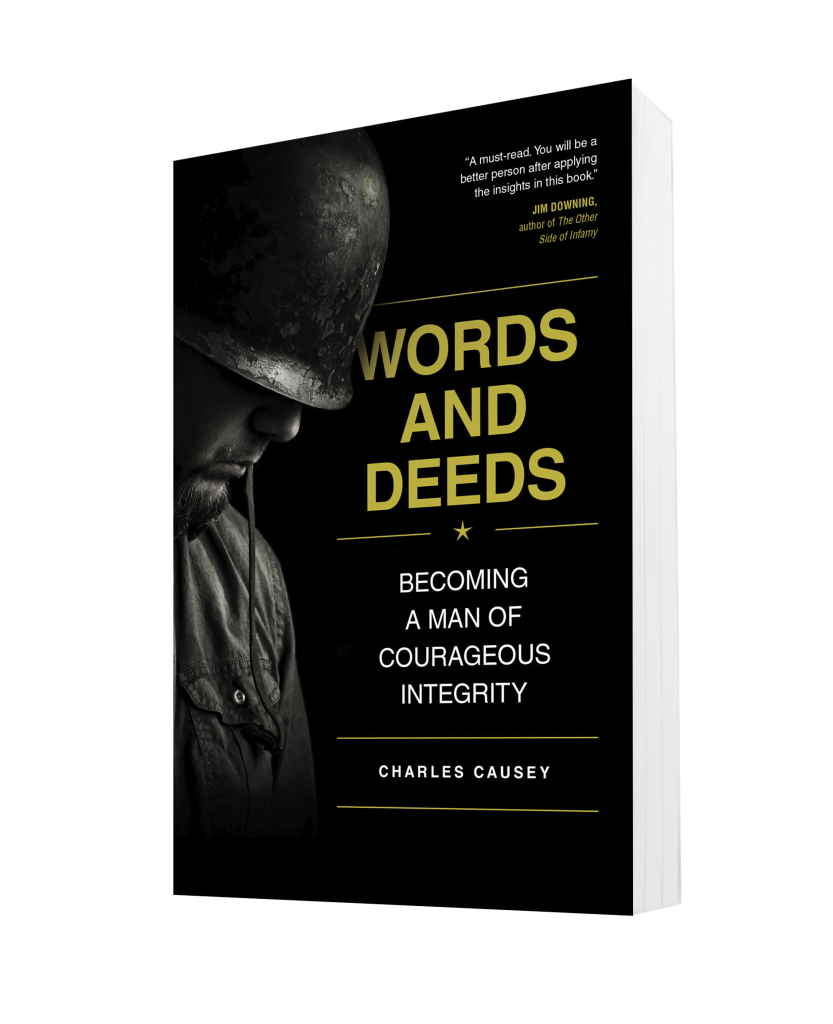Some men do not believe that true success in life and relationships is possible on this side of heaven, but they are mistaken. When our words and deeds are wise and aligned, then success becomes possible and relationships can be strengthened and restored. There is hope—and not a shallow hope, but a hope that does not disappoint. Peace and wholeness come into our lives as we live out the truths we believe.
But beware—there are several landmines we men must avoid.
The Reason for Gaps: Integrity Terrorists
You have declared yourself in the battle for integrity. There are three thieves, terrorists that will attack your integrity, seeking to destroy all the good you have achieved in your life. They are subtle—we can live with these thieves for years without awareness—but they are quietly and deeply sapping us. Like a hidden explosive device on a route recon, their deadly potential lies unnoticed until it is too late.
Pride (Arrogance)
Is your integrity ever terrorized by a low humility? The English word pride is associated with the Latin word superbia. Technically, it means an inordinate satisfaction derived from one’s achievements—self-esteem to the level that one looks down on others, or an unreasonable conceit about one’s talents. The problem with pride is enormous.
First, for believers, pride displays a lack of belief. The nature of God’s grace is that we cannot achieve a moral justification for our own existence, nor can we achieve enough righteousness for God to overlook the depth of our sin. Only the substitution of Christ’s righteousness for our own—through his atoning death on a cross—fits us for eternal life with God. If we truly believe this (and it is the basis of the Christian faith), there is no place for pride in our own accomplishments, because these achievements will not get us to heaven.

Because of our sin and our desperate need for salvation, we cannot look down on others. We all need God. We all need Christ’s forgiveness. The struggle with pride is essentially a struggle with unbelief. To indulge in pride is to denounce the simple gospel message, to remove God from His rightful place. Proud men take God’s rightful worship and are ever needy for more praise from other humans. True believers are satisfied knowing God loves them, and man’s praise is hollow. Thus, confession—not bragging—demonstrates faith for believers.
Second, pride can deceive us into thinking that we are actually better than other people. Proud people believe their opinions are the best, their personality is the best, and their decisions are the ones everyone should not only agree with but also praise. People suffering with pride have an enormous capacity for deception. No praise, honor, or admiration is too great for them. Those with pride become the center of everything. When others say something, the person with pride interprets the conversation as all about him. Benjamin Franklin stated that men wrapped up in themselves make very small packages, and this is very true. When self-focused, our effectiveness in every area of life is hindered.
A man’s pride will bring him low, But a humble spirit will obtain honor. Proverbs 29:23
Ultimately, a man lacking in self-awareness and steeped in pride will inflict pain on everyone around him. He will find himself in competition with others. Instead of simply doing his best, a proud man has to be the best at all costs, even if it lowers those around him. It is lost on him that greatness in the Kingdom is based on servanthood, suffering, and humility—traits in direct opposition to what pride seeks to gain.
Third, pride can make us believe we are the captain of our own ship. No position or place for us is so great that it guarantees our future. There is also no position so small that God does not see. He is the captain of our ship. He is in charge of whether we are raised or lowered. We are to accept every promotion or difficulty from His hand with similar grace and acceptance.
Many jealousies in the work place and even at church have to do with wanting to be someone we are not. A man not blinded by pride understands what his role is and is more concerned with impacting others than in being rewarded for every good deed; he knows he is ultimately rewarded by God and this gives him a calm assurance. He knows that when the team wins, he wins.
The mythological story of Narcissus is a lesson on the danger of self-absorption. As the story goes, the hunter Narcissus was proud of his beauty and disdained those who loved him. Tired of his arrogance, the gods lured him to a pool where, upon seeing his reflection, Narcissus instantly fell in love with his image and refused to ever leave. Choosing to stare at his beauty above all else, Narcissus eventually lost his will to live.
An arrogant man has enormous capacity for self-deception; unfortunately, most never see it. They choose to make their life an idol instead of investing it to help others. Others perceive that the man’s life is all about him—as the gods did with Narcissus—and quickly tire of his company. The man foolishly accepts that his greatest interest should be in himself.
Lying (Deceit)
Lying inherently violates the value of being a man of your word. A lie is an untruth. Some men struggle with lying because they like to mince words to give themselves some wiggle room; what they say dances right around the truth. Some call that a white lie. Other men lie outright. Those with integrity are always caught by surprise when they hear that someone told an outright lie. How could he do it? Has he no moral code?
A lying tongue hates those it crushes, And a flattering mouth works ruin. Proverbs 26:28
The reasons for lying are numerous. A well-timed fib can alleviate a problem, at least in the short-term. Little Johnny learned this in grade school when his teacher asked him if he did his homework. If he answered no, there were immediate consequences; if he answered yes, it delayed his teacher’s wrath and he had a fifty-fifty chance of going unnoticed. Even as adults, we depend on probabilities for getting away with small fibs. When we text folks and tell them we are on our way when we have not yet gotten into our car or we say we took care of something but it was not fully performed, we are doing the same thing as Johnny, playing the odds that we will probably not get caught.
This kind of behavior poses a big problem. People are not our number one audience—God is, and He sees all. Lying and fibbing shows a great lack of respect for not only the person we are offending but also the Person controlling our destiny. When we recognize that God’s presence is always with us then we can no longer tell others anything but the truth, because lying to others is essentially lying to God, who hears all.

Lying terrorizes and steals from our integrity because it puts self first, even before God. It shows no true concern or love for the other person because it does not give them an authentic view of who we are. Fractioning off the truth fractions off part of our lives, and we remain incomplete people. No wholeness exists in our relationships when lying is involved.
Lust (Envy)
Lust is a common topic in books for men, but the broader category and focus of this discussion is envy over what we do not currently possess. To be envious means to have a feeling of discontentment or resentfulness because of what someone else has gained. Such comparison is an integrity killer. If we are not content with ourselves for who we are then we will not be content with what we have.
True Statesmen are satisfied with their lot in life. It is not that they do not perform their best and move forward, but that they work to succeed out of a sense of joyful experience, not because someone else has it better than them. To work at something merely to attain what someone else has achieved is empty and unsatisfying. This goes back to calling. What have you been called to do? We find more purpose in keeping our eyes on the ball in our own field of play instead of pursuing someone else’s dream, calling, or position. How or why God positions other men should not be our chief concern in life.
S. Lewis wrote to a friend, Arthur Greeves, on September 12, 1933, about how sometimes in our longings we do not believe God wants the best for us and think that we know better than Him what direction to take.
Supposing you are taking a dog on a lead through a turnstile or past a post. You know what happens (apart from his usual ceremonies in passing a post!). He tries to go to the wrong side and gets his head looped round the post. You see that he can’t do it, and therefore pull him back. You pull him back because you want to enable him to go forward. He wants exactly the same thing—namely to go forward: for that very reason he resists your pull back, or, if he is an obedient dog, yields to it reluctantly as a matter of duty which seems to him to be quite in opposition to his own will: though in fact it is only by yielding to you that he will ever succeed in getting where he wants.

We humans long for happiness. But the reality is, most people seek it in directions that are ultimately not fulfilling. When we lust for what we do not have we buy into the lie that what we want for ourselves is better than what God wants for our lives. Lewis goes on to write the following:
God not only understands but shares the desire which is at the root of all my evil—the desire for complete and ecstatic happiness. He made me for no other purpose than to enjoy it. But He knows, and I do not, how it can be really and permanently attained. He knows that most of my personal attempts to reach it are actually putting it further and further out of my reach.
This is actually very freeing. We can rest in the security that God is in control of our life. We do not need to be concerned with how someone else is operating. Perhaps a friend of yours scored as a Statesman on his diagnostic and you scored as a Sentry. Should you be envious? The short answer is no. You have no idea how someone else operates on a day-to-day basis and how honestly they assessed themselves. And even if the results are accurate, you should be thankful for the mirror to see a broader picture of yourself. We should always strive for improvement, to be better in God’s eyes, but this striving is an individual concern, not a quest to be better than someone else.
A tranquil heart gives life to the flesh, but envy makes the bones rot. Proverbs 14:30
When we are men of integrated words and deeds, our lives are aligned around the right things. Our relationships are healthy and helpful to others. They are not based on quid pro quo (this for that). Men of integrity intuitively know that they do not need to envy things they currently do not have. All they truly need is taken care of by the Lord. Contentment—being happy with the life the Lord has provided—is the key here.
Here is a short fable from Aesop about contentment:
Once there was a dog who happily came upon a juicy piece of meat as he was running alongside a rapidly flowing river. When the dog glanced into the river, he saw his own reflection firmly holding the piece of meat in his teeth. Mistaking the reflection for another dog with something better, he opened his mouth to snatch it and ended up losing what he had when it dropped into the water.
How many men, like the dog, have reached out for what they thought would make them happy, only to realize they have now steered off course, that what they saw was a mirage? Men, there will always be things about your life you wish you could change. But accepting the life the Lord has given to you is the first step to true happiness.
Not all men struggle with one of the three integrity terrorists listed above. There are other vices, including anger, slothfulness, greed, and gluttony. When any of these terrorists overcomes a human heart, it takes its owner far away from the heart of Christianity. Thankfully, there are words and deeds which can boost our integrity and re-place Christ in the center of our lives.
Lt. Charles Causey is an army Chaplain currently stationed as garrison chaplain at Fort Dix in New Jersey. He has created a 40-question integrity assessment that analyzes and places men into one of four types – Sentry, Scout, Salesman, and Statesman. His book Words and Deeds breaks down those types and provides a road map for going from where you are after taking the test to becoming a man of greater integrity. Included is a 6-week bible study for men to dive deeper into the assessment as they become a band of brothers. Take the integrity assessment now or learn more at wordsanddeedsbook.com.


